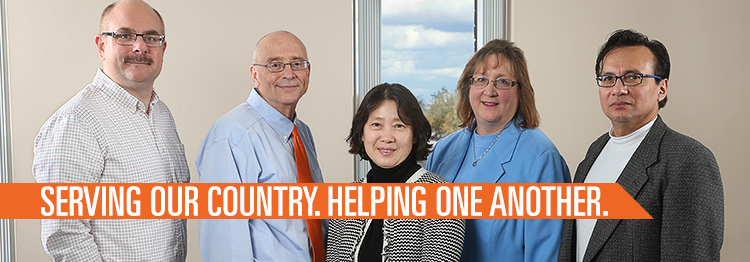Serving our country, helping one another
Serving our country. Helping one another.

By Julie Carle
Veterans of the Korean War may hold the keys to helping veterans of modern-day conflicts learn to reintegrate back into society.
Seven BGSU faculty and staff members are "Comparing Coping Strategies and Resiliencies of Korean War veterans, and Operation Enduring Freedom and Operation Iraqi Freedom Veterans." The research earned the 2013 Elwood Interdisciplinary Research Award from the Association of Schools of Allied Health Professions which provides seed money for the interdisciplinary research team to seek larger grants.
Having recently completed a series of focus groups that included veterans of the stated conflicts, the team members are optimistic about the early findings. The long-term hope is to create a grassroots effort that benefits all veterans. The early work is to identify common coping strategies, resiliencies and strengths of both groups, examine how older veterans have coped across their life spans, and explore how older veterans can serve as a resource to the younger veterans in their own societal reintegration efforts.
Dr. HeeSoon Lee, the principal investigator for the study, became interested in the research after connecting with a local group of Korean War veterans. As a native of South Korea, she met with them to see if they had photographs of their time in her native country. In December 2012, she presented to the Korean War vets a 37-minute DVD that she had developed. Throughout the process, she discovered they had a unique mindset worth exploring.
Approximately 35 veterans participated in the focus groups, answered the researchers' questions, shared stories and talked about their lives.
"It's been phenomenal, even better than anticipated," said Dr. Derek Mason, social work. "The bravery they exhibited by participating in the focus groups is amazing, and the insight they offer to noncombatants is very valuable."
Among the most important findings to date is the importance of partners, family and spouses to the veterans. "They serve as a buffer, a re-normalizer," Mason said. "Because things change while they are gone, family members, wives and partners serve as guides and help them navigate their new surroundings. They also provide unconditional support."
"One thing that hits me is how strong the men's and women's determination is," Mason said. "They are very patriotic and are proud of their service. They told us they like to feel the gratitude, but they don't necessarily care about celebrating."
This study is a perfect fit for Dr. Brett Holden, theatre and film, whose longtime interest in the issue of reintegration back into society for veterans has earned him accolades and recognition.
His goal is to learn more about veterans' perceptions of war films, why they do or don't watch the films and how they feel about the accuracy or inaccuracy of the movies. He understands that war films are often the primary way civilians learn about war, but often they are inaccurate or flat-out wrong.
"The civilian population thinks war is all about combat and dismisses the support personnel which is the majority of service members," Holden said.
"If war films have contributed to a wrong perception of military service, what influence does this have on reintegration," he questioned.
Holden wants to determine how film can assist rather than impede reintegration. "Through dialoging, and involving the veterans in the discussion, it might help explain their coping and resiliencies," he said.
"Possibly I can use the films to move into the dialogue and then use the vets as mentors through the process."
Dr. Peggy Adams, social work, was impressed with the mutual respect among all the groups. "The younger vets loved listening to the older vets' stories."
They shared their experiences through stories and photographs. "They talked the same language; they understood what they were talking about. It validated the experience for both groups," Adams said.
The project to date has provided a new perspective for her as a service provider. "If we understand people's framework, we can learn a lot to help future veterans."
An interesting difference between the younger and the older veterans is how they interact with others. The older group is more comfortable coming together and talking about things face-to-face. "That is not necessarily the case with the younger generation. Their whole way of communicating is different - text, email, phones. We need to figure out how to bridge that communication gap," Adams said.
Overall, the hope is to establish some mentoring, grassroots efforts, that could be helpful for people in transition.
"Grassroots is where the strength is because it comes from people's hearts," Adams said. Whatever direction the study goes in the future will require a commitment to maintain a safe and nurturing environment for the veterans.
Holden suggested a network could be established to take advantage of the "decade upon decade upon decade of experience and the lifelong successful careers these Korean War vets have."
"How can a retired real estate agent help the younger vets with the process of buying a home or how can a banker help them with investing?" he said. "How can whatever is created be reciprocal? We have stumbled upon something very valuable. They provided a great deal of data, now we just have to figure out how we can help them."
This work could be cutting edge, according to Mason. He completed a literature review and found no similar research. "This could serve as a template for additional work by other institutions in the future," he said.
With the first focus groups completed, the team will come together, look at the transcripts to identify themes and commonalities. Other team members involved in the study include Eric Buetikofer, nontraditional and transfer students; Dr. Louis Guardiola, social work; and Dr. Hyungsuk Chook, tourism, leisure and event planning.
Updated: 12/02/2017 12:56AM
